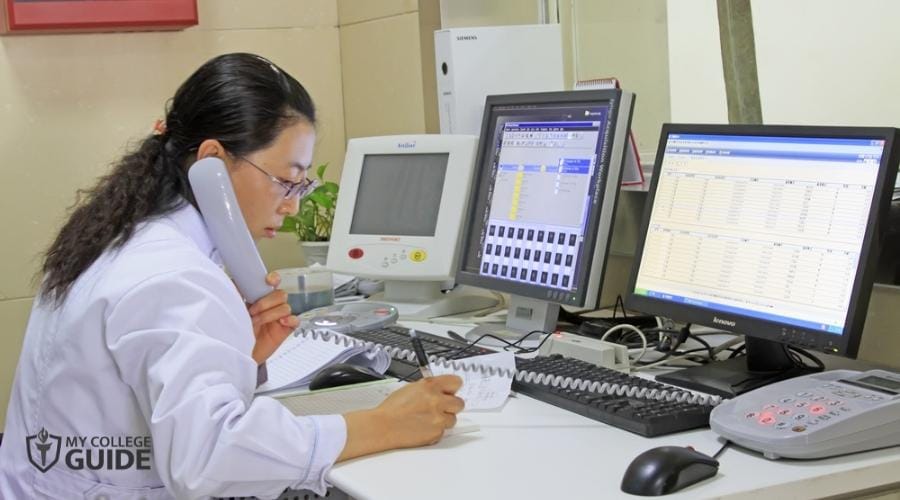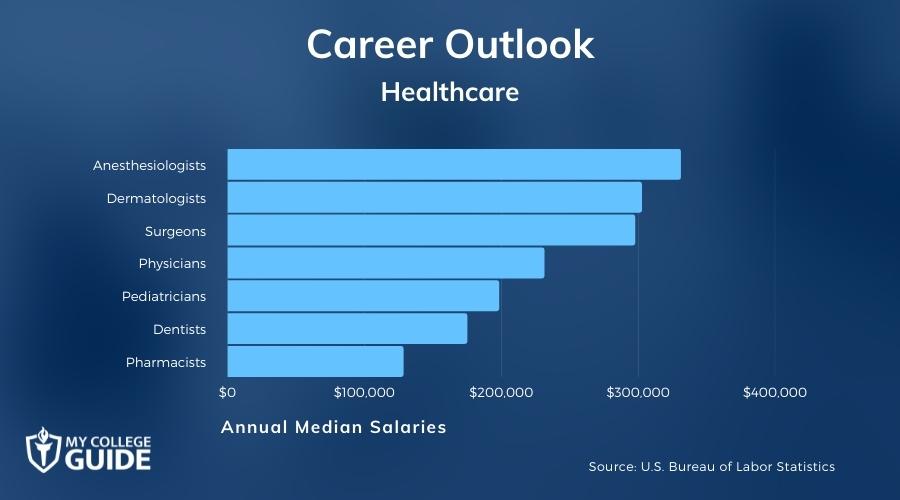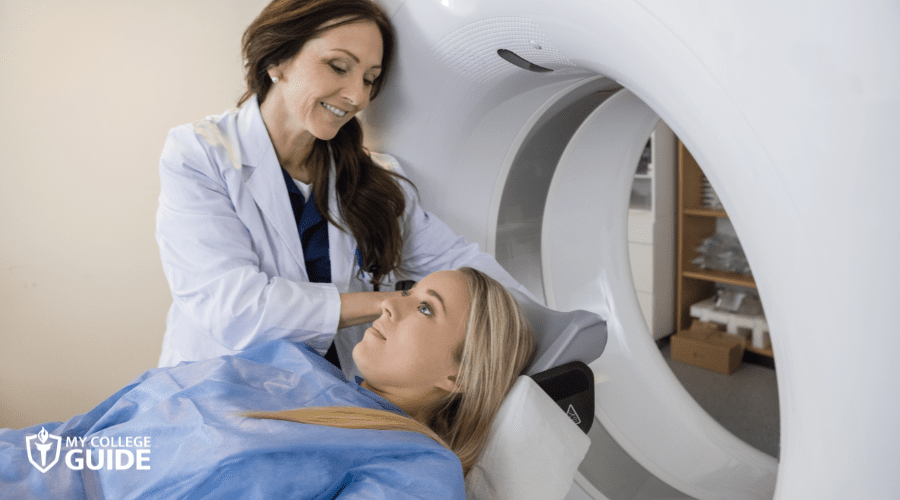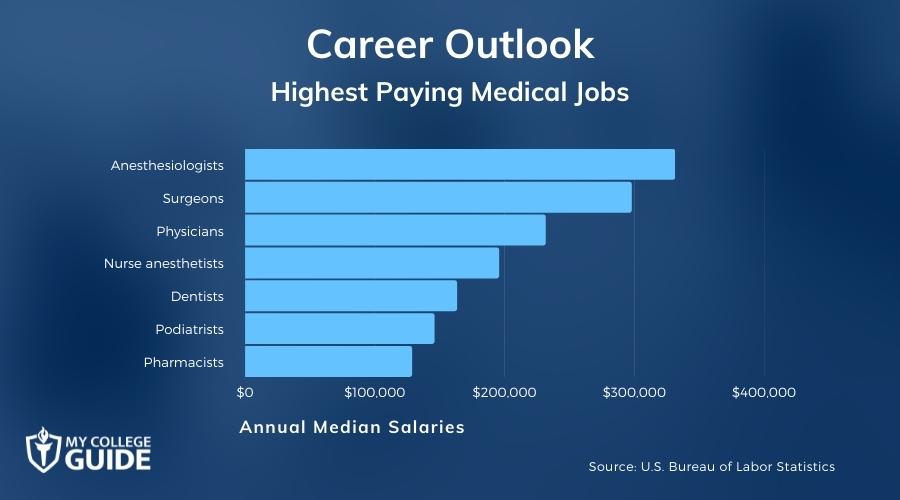When deciding to enter the healthcare field you may be wondering what medical majors in college are best for your career path. The health care field is wide open with career options. Depending on your strengths and if you prefer to work behind the scenes or directly with patients can help you choose the right career path for you.

What’s even better is that healthcare is one of the top hiring industries for bachelor’s degree graduates in recent years. Salaries for students pursuing undergraduate degrees in health science areas make it a lucrative option.
Editorial Listing ShortCode:
While you have many career options when choosing a path in healthcare, it’s important to think about what drives you. Do you prefer working with patients daily, or do you enjoy the analytical and research side of medicine? Once you know what you’d career you’d to pursue, you can then choose the right major for you.
Medical Field Majors

Health care majors aren’t limited to pre-med and nursing. There are many different online degrees in medical and health sciences. As you consider various degrees in the medical field, it is helpful to think about your strengths, your interests, and how long you’d like to spend preparing for your chosen career.
Select the program that most interests you to jump to that section of the guide:
- Biology
- Clinical Research
- Community Health
- Dental Hygiene
- Health Information Technology
- Health Information Management
- Health Services
- Healthcare Administration
- Long Term Care
- Medical Assisting
- Medical Billing & Coding
- Nursing
- Nutrition and Dietetics
- Occupational Therapy
- Pharmaceutical Sciences
- Physical Therapy
- Psychology
- Public Health
- Radiologic Technology
- Speech-language Pathology
Exploring your options may help you determine which academic path is right for you.
Biology

The science of living organisms is biology. As such, biology could be a good degree option for people who want healthcare careers. You’ll learn about ecology, cell biology, and genetics. There will likely be many lab experiences.
Editorial Listing ShortCode:
With a biology degree, you might work as a lab technician. Jobs in forensic or environmental science might also be available. Also, studying biology at the undergraduate level could prepare you for professional degrees in medicine. After completing your bachelor’s degree, you could apply to medical school or another professional program, such as dental or pharmacy school.
Clinical Research

Medical breakthroughs are usually the result of meticulous research. You could launch a career in medical science with a bachelor’s degree in clinical research.
The program introduces you to the scientific method as well as research laws and ethics. In your studies, you may also learn how to develop and run effective studies. Practicing science writing can help equip you to share your findings with the world.
Editorial Listing ShortCode:
After graduation, you’d probably be most qualified to work as a clinical research assistant. Over time, you might move into associate positions and then work your way up to a management role.
Community Health Education

If you want to help people make healthy choices, you might do well in a health education college program. You’ll learn how to educate people and influence their behavior.
This program emphasizes public health, including introductory epidemiology. You will have courses on communication and behavioral science, too. In addition, you may study how to implement, run and evaluate programs.
Editorial Listing ShortCode:
Many people with this degree work as health education specialists. Other possible job titles include program manager, human service specialist, and wellness director. Employment may be available in public health departments, community agencies, and hospitals.
Dental Hygiene

When you’re looking for majors in the medical field, don’t forget about the importance of oral health! If you work as a dental hygienist, you’ll help people take care of their teeth and mouths.
In dental hygiene school, you’ll learn about microbiology, human physiology, and the anatomy of the head, neck, and mouth. The coursework will teach you to clean and care for people’s teeth too. Clinical experiences will be an important component of this program.
Editorial Listing ShortCode:
Dental hygiene studies often lead to an associate degree. With your degree, you might qualify for licensure and a job in a dental office.
Health Information Technology

In the healthcare environment, technology plays an important role. Medical records are entered and maintained using electronic systems. Health information technology professionals are responsible for those systems.
This field of study is often offered at the associate degree level. It may include classes in databases, medical coding, and regulatory compliance. A school that has this program at the bachelor’s degree level may include concentration options, such as data analytics or community health.
Editorial Listing ShortCode:
Graduates often work as health information technologists. Some oversee electronic health records (EHR) systems. Others perform data analyses. People with this degree may also work as medical records specialists.
Health Information Management

Professionals in the health information management (HIM) field deal with healthcare data. Medical facilities have data from patients, insurance companies, other doctors, and more.
HIM professionals deal with the technology to store those records, organize them and retrieve the data as needed. Medical coding and classification are important for students in this field to study. The curriculum may also have courses in databases, reimbursement, technology, medical terminology, and privacy law.
Editorial Listing ShortCode:
People with this degree often take jobs related to medical records, databases, and information systems management. Pursuing the Registered Health Information Administrator (RHIA) industry certification could increase your earning potential.
Health Services

For a broad look at many aspects of healthcare operations and leadership, you could consider a degree in health services. This field is sometimes known as health services management.
A health services program gives students a look at the healthcare system, including delivery and reimbursement. The degree program also teaches business and management skills that are relevant to working in the medical field. Technology, finance, decision-making, and communication may be some of the topics.
Editorial Listing ShortCode:
Graduates may work as medical and health services managers. Jobs may be found in doctor’s offices, hospitals, nursing homes, and other medical facilities.
Healthcare Administration

Most healthcare organizations are made up of many different departments. Effective management helps them run smoothly. You can prepare for such roles in a healthcare administration program. In this program, you will likely take a variety of business classes. They’ll cover topics like marketing and finance. In other courses, you will study healthcare and related topics.
Editorial Listing ShortCode:
With this degree, you might oversee particular departments in healthcare organizations. You could be a medical records manager or a clinical manager. Health facilities also need people to fill roles like HR manager and marketing manager.
Long Term Care

Residential facilities meet an important need for the elderly and others who need safe, supportive places to live. If you’re interested in creating quality living environments for those people, then you might want to study long-term care administration in college.
Editorial Listing ShortCode:
Gerontology is a common topic for students in this field to study. Other classes might include nonprofit management, organizational leadership, systems for health information, and program development. This degree could lead to management positions in residential facilities. Many of those positions will require state licensure, and getting this degree could help you meet the qualifications.
Medical Assisting

Healthcare facilities often depend on medical assistants for both clinical and clerical duties. Assistants work alongside doctors and nurses to help deliver comprehensive patient care.
Medical assistant training is commonly offered as an associate degree program. Students learn about medical terminology, the human body, and the healthcare system. There are clinical experiences in which students can put their lessons into practice.
Editorial Listing ShortCode:
If you decide to become a medical assistant, you might work in a doctor’s office, a hospital, or an outpatient facility. The job responsibilities might include checking in patients, taking temperatures, giving injections, and setting up appointments.
Medical Billing & Coding

Healthcare organizations use electronic records to enter and organize information about patients’ medical care. The data includes various codes to denote procedures and treatments. The codes are used for billing and insurance purposes.
Dealing with medical codes requires special training. You can gain the necessary education in an undergraduate program for medical billing and coding. In addition to learning about coding systems, you might also become familiar with privacy laws, healthcare software, and strategies for data analysis.
Editorial Listing ShortCode:
Graduates may work as medical coders or other types of medical records specialists. Some people move into management roles.
Nursing

Nurses are an essential piece of the healthcare system. If you aspire to be a nurse, getting a Bachelor of Nursing Science (BSN) could be the best way to go about it. In a four-year nursing program, you’ll likely acquire a well-rounded education, gain invaluable nursing knowledge, and complete clinical experiences.
Editorial Listing ShortCode:
Nursing students study anatomy and physiology, pharmacology, ethics, nursing technology, and human development. Clinical experiences are common in this program. After earning this degree, you may qualify for licensure as a registered nurse (RN). You might also be eligible to go to graduate school for a Master of Nursing Science (MSN).
Nutrition and Dietetics

The field of nutrition and dietetics focuses on helping people nourish their bodies. The topics included in this program may include nutrition fundamentals, food safety, and the human body. You might learn to oversee food service programs, counsel clients, and work with diverse families. Some programs include an internship component.
Editorial Listing ShortCode:
This degree could help you meet the requirements for pursuing select industry credentials. You could also move from the bachelor’s program into a dietetics graduate program for further opportunities. Your job possibilities will vary based on your level of certification, but jobs might be available in schools, hospitals, or residential facilities.
Occupational Therapy

In an occupational therapy degree program, you’ll study anatomy, biology, and psychology. You will also learn about assessments and techniques used in the OT field. There may be many opportunities to observe the types of people you’ll later be working with as a practitioner.
Editorial Listing ShortCode:
Some bachelor’s degree programs in this field are for occupational therapy assistant preparation. After completing the program, you may be able to apply for state licensure and work as an assistant. Others are pre-OT programs. They typically lead to further study at the master’s or doctoral level so that you can then work as an occupational therapist.
Pharmaceutical Sciences

A career in the pharmaceutical industry requires a firm grasp of science and healthcare. You can learn those things in a pharmaceutical sciences bachelor’s degree program. Biochemistry and organic chemistry are some of the foundational subjects required for this program. Additional courses might include drug development process and pharmaceutical dosing.
Editorial Listing ShortCode:
This degree program could help you launch a career in pharmaceutical manufacturing or marketing. You could pursue work in any part of the drug process, from development through sales. This degree could also be the first step toward advanced studies, whether a scientific Ph.D., a Doctor of Pharmacy (PharmD), or another professional healthcare degree.
Physical Therapy

If you’re interested in a healthcare major related to physical therapy, you may have a few options. Some schools offer physical therapy assistant bachelor’s degrees. Others have pre-physical therapy degree programs.
In either program, you might learn about the human body and movement. Assistant programs will delve into specific treatment and rehabilitation practices. Pre-physical therapy programs are more likely to spend more time building a strong foundation of math and science coursework.
Editorial Listing ShortCode:
If you complete an assistant program, you may qualify to begin a career as a physical therapy assistant. For those who graduate with a degree in pre-physical therapy, the next step is to earn a Doctor of Physical Therapy (DPT).
Psychology

Students in psychology programs learn about the thoughts that go on inside people’s heads and how those thoughts influence behavior.
Psychology departments often offer classes like human lifespan development and personality theories. There are many branches of psychology. You’ll study a variety of them during your undergraduate program. Examples include social psychology, behavioral psychology, and industrial-organizational psychology.
Editorial Listing ShortCode:
Some people with undergrad degrees in this field go on to become public relations specialists, human resources specialists, human services coordinators, or correctional counselors. Others enter grad school with to become clinical psychologists, school psychologists, or survey researchers.
Public Health

People who want to influence health outcomes on a large scale often go into public health. Professionals in this field deal with health and wellness at the community and population levels.
If you choose public health as your major, you’ll take classes in medical terminology, epidemiology, and environmental health. The curriculum might also include courses in program implementation, health research, and health education.
Editorial Listing ShortCode:
Potential jobs for this degree include community health worker, health educator, and environmental health specialist. Or, if you’re interested in becoming an epidemiologist, you might want to continue your schooling with a Master of Public Health (MPH).
Radiologic Technology

Degrees in radiologic technology focus on medical imaging. X-rays may be the primary imaging modality you’ll learn.
The bachelor’s degree program may also allow you the opportunity to study ultrasound, CT scans, or magnetic resonance imaging (MRI). For this degree program, you’ll study science disciplines like biology and human anatomy. As you take classes in imaging principles and techniques, you’ll have many clinical experiences.
Editorial Listing ShortCode:
By the time you graduate, you may qualify for one or more industry certifications. Some students become certified by the American Registry of Radiologic Technologists (ARRT) during the program and start working as radiologic technologists right away.
Speech-language Pathology

Choosing to major in speech pathology could prepare you to help people with communication, hearing, or swallowing disorders. In this program, you’d take classes like hearing science, literacy fundamentals, and speech-language treatment.
Earning this degree could prepare you for licensure of some sort. For example, you might be qualified to work as audiology or speech-language pathology assistant. Possible employment sites include nursing homes, schools, and healthcare facilities.
Editorial Listing ShortCode:
This bachelor’s degree could also lead to further study. With a master’s degree, you might become a speech-language pathologist (SLP). A doctorate could qualify you to work as an audiologist.
Preparation in High School

To prepare for a challenging health care major, most colleges recommend that you take as many science and health courses as you can in high school, such as biology, chemistry, and physics, as well as math and statistics courses.
Honors and AP courses may help prepare you for the rigor of college, too. In addition, you may want to consider volunteering in medical settings, such as free clinics, nursing homes, and anywhere you can learn to work with people and develop interpersonal skills.
Another option is to visit your doctor’s office and ask if you can shadow a medical professional. It’s important to seek out leadership positions in class and in extracurricular activities, but you may want to only concentrate on a select number of activities. It’s important to know your limits and not stretch yourself too thin.
While health care academic programs can be challenging and some require more than four years of college, don’t let that stop you. You can use your high school years to prepare yourself for the challenge of medical school.
Healthcare Careers & Salaries

Average salaries for health care occupations have been increasing in recent years. Some occupations may require a degree beyond a bachelor’s degree and also may require state or national licensure.
According to the U.S. Bureau of Labor Statistics, here are the annual median salaries for different careers in medical field.
| Careers | Annual Median Salaries |
| Anesthesiologists | $331,190 |
| Dermatologists | $302,740 |
| Surgeons | $297,800 |
| Physicians | $231,500 |
| Pediatricians | $198,420 |
| Dentists | $175,160 |
| Pharmacists | $128,570 |
| Optometrists | $124,300 |
| Physician Assistants | $121,530 |
| Medical and Health Services Managers | $101,340 |
| Physical Therapists | $95,620 |
| Medical Scientists | $95,310 |
| Dental Hygienists | $77,810 |
| Diagnostic Medical Sonographers | $77,740 |
| Registered Nurses | $77,600 |
| Radiologic Technologists | $61,980 |
| Dietitians/Nutritionists | $61,370 |
| Mental Health Counselors | $48,520 |
| Athletic Trainers | $48,420 |
| Health Technologists and Technicians | $46,910 |
Health care careers encompass more than doctors, nurses, and other professionals who directly care for and treat patients—careers can also center on administration or sales and marketing. So you might work with patients, or work behind the scenes as a communicator, manager, scientist, or public health professional.
If you’re interested in working directly with patients, there are many career paths to consider with a positive outlook for those graduating college. The healthcare field in general is expected to see a 13% increase over the next 10 years, which is estimated to add 2 million jobs to the market. Nurses, specifically, will see a 6% growth rate over the same period.
Editorial Listing ShortCode:
If you’re more interested in the administration side, medical and health services managers are projected to grow 28 percent over the next decade. Health care management is a popular choice for students and allows them to pursue a career as an administrator of a hospital or medical clinic.
Career options in the medical field can be rewarding as you work toward the advancement of the healthcare industry and help others in the process.
How to Know the Right Medical Major for Me

When you consider the many different majors in medicine or healthcare, it may seem hard to decide which you should go for. To help you figure it out, think about your preferences and goals.
Consider factors such as:
- Income potential: In general, healthcare practitioners make more than those in healthcare support roles. The top-paying healthcare careers consistently offer six-figure salaries.
- Job growth: In general, the BLS says that healthcare jobs are increasing at a 13% rate. Some, such as advanced practice registered nurse roles, are growing even more quickly.
- Time in school: Some healthcare careers need a two-year associate degree while others demand years of professional training after an undergraduate degree.
- Work environment: Not all healthcare jobs involve working with patients as some are done in a lab or an office. If you know you want to work directly with patients, you may want to avoid research-based careers.
It may be a good idea to consult people who work in your chosen career path to learn more about whether it’s a good fit for you.
Pre-professional Health Programs

While some health care careers require only a bachelor’s or master’s degree, others require a professional degree, like an M.D. or Ph.D. If you’re interested in an area that requires a professional degree, talk with your college academic adviser or admissions counselor to determine the most appropriate bachelor’s degree program for you.
Editorial Listing ShortCode:
Some colleges offer special pre-professional program tracks, such as pre-dentistry, pre-medicine, pre-optometry, pre-pharmacy, or pre-veterinary medicine, while others encourage you to major in a specific area related to your career interests, such as biology, chemistry or psychology.
These programs offer some benefits like:
- Prepare you for further study
- Prepare you to take professional school entrance exams, such as the Medical College Admission Test (MCAT) or a Graduate Record Examination (GRE)
- Completing a pre-professional program may offer you an advantage when applying to med school or other graduate schools of your choice
Before you apply to a professional school, it’s a good idea to research what will be required of you and where your focus will be. For example, there are jobs, but you will need to perform well in the sciences to be competitive. Professional school programs are very rigorous and students should be prepared mentally.
How to Choose an Online Healthcare Program

When choosing the right online healthcare program for you, there are a few things you may want to consider, including:
- Accreditation: It’s important to look for a program that is accredited in the specific area or degree you want to pursue. There are a growing number of accredited online medical degrees and schools available for you.
- Licensing: Some programs require you to take a licensing exam before or after graduation. You may want to ask the school about students’ first-time pass rates for the exam.
- Degree: It is a good idea to find out (and be prepared) if you need to get a graduate or professional degree for certain occupations. Knowing this information can help you choose the right online degree program.
- Experience: If an academic program requires classroom and clinical experience, consider looking for a program where you can do it all at one school. Some colleges offer 5-year programs that provide the classroom work and clinical experience you’ll need in order to obtain a job in the field and/or to take a specific licensing exam.
- Admissions: Admission requirements for health care majors may be higher than for other majors or have additional admission steps (usually due to a limited number of required clinical placements). Check to see if the undergraduate curriculum will prepare you to meet the criteria to apply to a major, or to a master’s or professional degree program in your field, if needed.
- Schedule: It’s a good idea to consider your schedule and how much flexibility the program offers. Online healthcare programs tend to offer quite a bit of flexibility but it’s still helpful to check if this is an important factor for you.
When choosing an online healthcare program, it’s important to consider the above factors and make sure the school is right for your needs and specific career path. After researching schools, you can always check with admissions offices to ask additional questions.
Editorial Listing ShortCode:
In addition, some schools have early acceptance programs and affiliations with certain hospitals or clinics that can help students get out of school and into the job market faster. Dual acceptance programs, where you apply to both the college and professional school when you’re a high school senior, can put you on track for early entry into a professional program.
What are the Most In-Demand Health Care Careers?

Whether you are looking for a health care career taking care of patients, working in a lab, or managing health care systems, there is a career out there for you. Here are some of the in-demand health care careers and their projected growth rates over the next 10 years according to data from the BLS.
- Athletic Training: Help athletes and fitness enthusiasts prevent and recover from sports injuries. This career is expected to see a 17% growth rate over the next decade.
- Mental Health Counseling: Diagnose and treat patients with mental or behavioral health issues. Requires a master’s or doctorate degree. This field is expected to see a 22% growth rate over the next decade.
- Dentistry: There are many different specialties in dentistry, such as orthodontics, periodontics, and oral and maxillofacial surgery. Dentists are expected to see a 6% growth rate over the next 10 years.
- Dietetics: Help people eat healthier and address health issues, such as diabetes, through nutritional and health education. This field is expected to see a 7% growth rate over the next decade.
- Medical and Health Services Managers: Combine business and biology to be an administrator of a hospital or medical facility. This field is expected to see a 28% growth rate over the next decade.
- Medical Laboratory Science: Perform analyses on body fluids and other specimens at hospitals, clinical laboratories, or biotechnology labs. This career path is expected to see a 7% growth rate over the next 10 years.
- Nursing: Registered nurses care for sick and injured patients in hospitals, doctor’s offices, nursing homes, private homes, or schools. Registered nurses are expected to see a 6% growth rate while nursing assistants and orderlies will see a 5% rate.
- Pharmacy: Dispense prescription medications and advise patients of their safe use. Pharmacists will see a 2% job growth rate.
- Physical Therapy: Assist patients with mobility and movement impairments. This field is expected to see a 17% growth rate over the next 10 years.
- Medical Sonographers: Use ultrasound to detect and treat different health conditions. This field is expected to see a 10% growth rate over the next 10 years.
- Radiologic Technology: Use X-rays, CT scans, and other radiologic equipment to diagnose injuries and diseases. Radiologic and MRI technologists are projected to grow 6% over the next decade.
- Veterinary Science: Diagnose and treat injuries, illnesses, and diseases in animals. Veterinarians are projected to grow 19.
As you can see, there is a wide variety of health care career options. Once you decide on the field you’d like to be in, you can then narrow down your career options.
What are the Highest Paying Medical Jobs?

Many healthcare jobs pay quite well. Some of the highest-paying roles are shown below along with salary information from the Bureau of Labor Statistics.
- Anesthesiologists: $331,190
- Surgeons: $297,800 and up, depending on specialty
- Physicians: $231,500 and up, depending on specialty
- Nurse anesthetists: $195,610
- Dentists: $163,220
- Podiatrists: $145,840
- Pharmacists: $128,570
- Optometrists: $124,300
- Physician assistants: $121,530
- Nurse practitioners: $120,680
These figures are based on national averages and may not represent your actual earnings.
Getting Your Medical Degree Online

There are a wide variety of majors in the health field that could help you launch a healthcare career. Whether you want to conduct research, work in an office or provide hands-on clinical care, your work could help people achieve greater health and wellness.
You can start your healthcare training with online studies — a fast and flexible way to earn a degree. Online courses are available for many different health majors, including biology, healthcare administration, nutrition, and more.
Accredited online colleges offer reputable healthcare training. Explore the options and find an online healthcare program that works for you.
